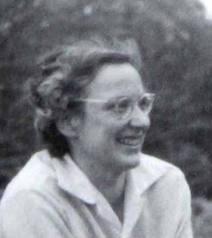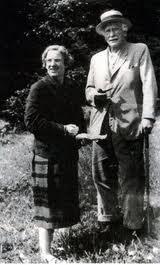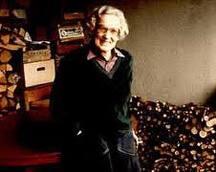
Marie-Louise von Franz
January 4, 1915 - February 16, 1998

The following biographical obituary of Marie-Louise von Franz,
written by Chuck Schwartz, originally appeared in The Independent,
based in the U.K., on Monday, 23 February 1998
Marie-Louise von Franz was renowned on several counts. She was a first-rate and compassionate analyst. She was the closest colleague of C.G. Jung, with whom she worked for over 30 years, and contributed a great deal to his major works, particularly his monumental studies on psychology and alchemy. She was also the author of a number of books including a whole collection on the psychology of fairy tales, and was a leading authority in this field.
What is exceptional about her books on fairy tales is their readability. She possessed few theoretical formulations, and her direct and colloquial style of English (not her mother tongue) makes her writing easily accessible and as fascinating to read as the tales themselves. Through it, people from all walks of life have been made aware that these timeless tales are not the sole preserve of children and are struck by how relevant they are to their daily lives.
The first of these books, Problems of the Feminine in Fairytales (1972), was published in 1972; it was followed by An Introduction to the Interpretation of Fairytales (1973), Shadow and Evil in Fairytales (1974) and several others. They are still best sellers in the psychology world and seem set to remain so.
There are many other books by her on a variety of subjects. Among the most distinguished are Number and Time (1980), on the connection between psychology and modern physics; a detailed scholarly work, in collaboration with Emma Jung (Jung's wife) on the symbolism of the Grail legend; Aurora Consurgens, a translation and exposition of an early alchemical text ascribed to St Thomas Aquinas; and Jung, His Myth in Our Time (1972), a biography, elucidating Jung's essential work.
Von Franz also wrote a landmark book called The Problem of the 'Puer Aeternus', on the "eternal youth", an increasingly common visitor to the consulting room, who lives his life as if his time has not yet come; a strictly provisional life which results in a refusal to commit to the moment, be it a job, a partner, or anything to do with the here and now. This is often accompanied by a fascination with flying or mountain climbing, the symbolism being to get as high as possible and as far away from the mundanities of ordinary life. She also published several other books on alchemy, dreams, classical mythology and the psychology of projection.
Marie-Louise von Franz was born in Munich of Austrian parents, but spent most of her life in Switzerland. Even in primary school she had a reputation for a formidable intellect. She was, for example, unwilling to accept the tenets of the religious education taught at her school. She so exasperated the priest who was teaching her class that he insisted upon giving her private lessons. The upshot, according to a repentant von Franz, was that he completely lost his faith and left the priesthood.
She went on to attend the University of Zurich and reached a stage where she had to choose between a doctorate in classical languages or studying medicine. She had by now started analysis with Jung and told him about a dream that indicated to him that she should choose classical languages. It was a brilliant choice, particularly for Jung, who from then on got all the Greek and Latin texts he needed for his work translated for the price of free analytic sessions.
When von Franz was 41, Jung permitted her to take on her first client. The client was a woman on the verge of a nervous breakdown. Von Franz was natually eager to make a success of her first case, but the harder she tried to prop the woman up the worse she became. In despair she turned to Jung who advised her to let the client have her nervous breakdown. Von Franz backed off, and stopped straining to help, and the woman soon made a full recovery.
She said that this was the most important lesson she ever had on therapeutic technique, showing her the limitations of willpower and the Ego, and the role of the Unconscious as the centre of the personality.
She likened this to Galileo's discovery that the Earth revolved around the sun, not vice versa. Like the Earth the Ego is an important satellite revolving around a much larger and more powerful centre. Galileo's discovery got him excommunicated by the ruling establishment, and Jung has suffered a similiar fate at the hands of the scientific establishment.
For Jung, the structure of the psyche's centre was made up of what he called "archetypes", the fundamental building blocks or anatomy of psychic life. Like every other part of the human anatomy the "archetypes" were common to all people; this commonality he called the Collective Unconscious.
Some years ago von Franz predicted that, like Galileo's discovery, future generations of researchers would discover these self-same psychic structures without any reference or acknowledgement to Jung. This she felt would be only right and proper. For the fact that they made this discovery independently would prove that Jung's work was not at all hypothetical but was based on the objective facts of psychic life.
In the last few years a whole new breed of evolutionary psychologists have indeed rediscovered these self-same structures, and rechristened them in such terms as "mental modules", often without any reference to Jung's work.
Working on this archetypal level von Franz soon realised that, for her at least, the only effective and decent way to work with a client was to work on the material of her own life, both inner and outer - in other words to set her own house in order.
Her model for therapy, therefore, which she imparted to all her pupils, was not at all modern or even post-modern. It was as simple as it was disconcerting: "Work very hard on your own psychic life, and hope for a synchronistic happening in the client's. In this way everything is kept open and alive and there are no set rules."
That is except perhaps for one rule. Von Franz counselled that it would be wrong to become a Jungian. If you do that, you miss the whole point of his psychology, which was to become the one unique individual you are meant to be.
Everyone who knew Marie-Louise von Franz, or her work, can see to what remarkable degree she achieved her individuality.
Chuck Schwartz
Marie-Louise von Franz, analytical psychologist: born Munich 4 January 1915; died Kusnacht, Switzerland 16 February 1998.


Selected Writings
Alchemical Active Imagination
Alchemy: An Introduction To The Symbolism And The Psychology
Animus and Anima in Fairy Tales
Archetypal Dimensions of the Psyche
Archetypal Patterns in Fairy Tales
Aurora Consurgens: A Document Attributed to Thomas Aquinas on the Problem of Opposites in Alchemy (2000)
C. G. Jung: His Myth in Our Time
Creation Myths
Dreams (1991)
Feminine in Fairy Tales
Individuation in Fairy Tales
Light from the Darkness: The Paintings of Peter Birkhäuser (1980)
Number and Time (1974)
On Divination and Synchronicity
On Dreams & Death: A Jungian Interpretation
Projection and Re-Collection in Jungian Psychology: Reflections of the Soul
Psyche and Matter (1992)
Psychological Meaning of Redemption Motif in Fairytales
Puer Aeternus: A Psychological Study of the Adult Struggle with the Paradise of Childhood
The Cat: A Tale of Feminine Redemption
The Golden Ass of Apuleius: The Liberation of the Feminine in Man
The Interpretation of Fairy Tales
The Passion of Perpetua: A Psychological Interpretation of Her Visions (2004)
The Problem of the Puer Aeternus
The Shadow and Evil in Fairy Tales
The Way of the Dream
The Way of the Dream (DVD)
~ Additionally, von Franz collaborated with Emma Jung on The Grail Legend, which discusses the psychological symbolism of the documented legends of the Holy Grail.
++++
Way of Dream ~via Marie-Louise von Franz ~Video 2 (full) ~ http://youtu.be/VruydAED7XY ~Uploaded on Aug 4, 2011
++++
Way of Dream ~via Marie-Louise von Franz ~Video 3 (full) ~ http://youtu.be/PXr8CWX_wIM ~ Uploaded on Aug 11, 2011
++++
Way of Dream ~via Marie-Louise von Franz ~Video 4 (full) ~ http://youtu.be/TZw95I9i9TA ~Uploaded on Nov 25, 2011
++++
Marie-Louise von Franz (4 January 1915 – 17 February 1998) - Wikipedia, the free encyclopedia ~ http://en.wikipedia.org/wiki/Marie-Louise_von_Franz ~
Marie-Louise von Franz.com - Home (English) ~ http://www.marie-louisevonfranz.com/en/ ~
Marie-Louise von Franz, 83, A Jungian Legend, Is Dead -Published: March 23, 1998 ~via @NYTimes: http://www.nytimes.com/1998/03/23/world/marie-louise-von-franz-83-a-jungian-legend-is-dead.html?pagewanted=all&src=pm ~
Marie-Louise von Franz - Wikiquote ~ http://en.wikiquote.org/wiki/Marie-Louise_von_Franz ~
Who is Marie-Louise von Franz? http://www.jungiananalystvt.com/AboutMarieLouisevonFranz.en.html ~
“There are people who cannot risk loneliness with the experience. They always have to be in a flock and have human contact.” ~ Marie-Louise von Franz, Alchemy: An Introduction to the Symbolism and the Psychology ― ++++
++++++++++++++++++++++++++++++++++
Key Profiles, Bios + Links Blog
http://key-profiles.blogspot.com/
HELP Portal ~ http://help-matrix.ning.com/ ~
Peta_de_Aztlan Blog ~ http://peta-de-aztlan.blogspot.com/ ~ @Peta_de_Aztlan
+++++++++++++++++++++++++++++++++++++++++


No comments:
Post a Comment